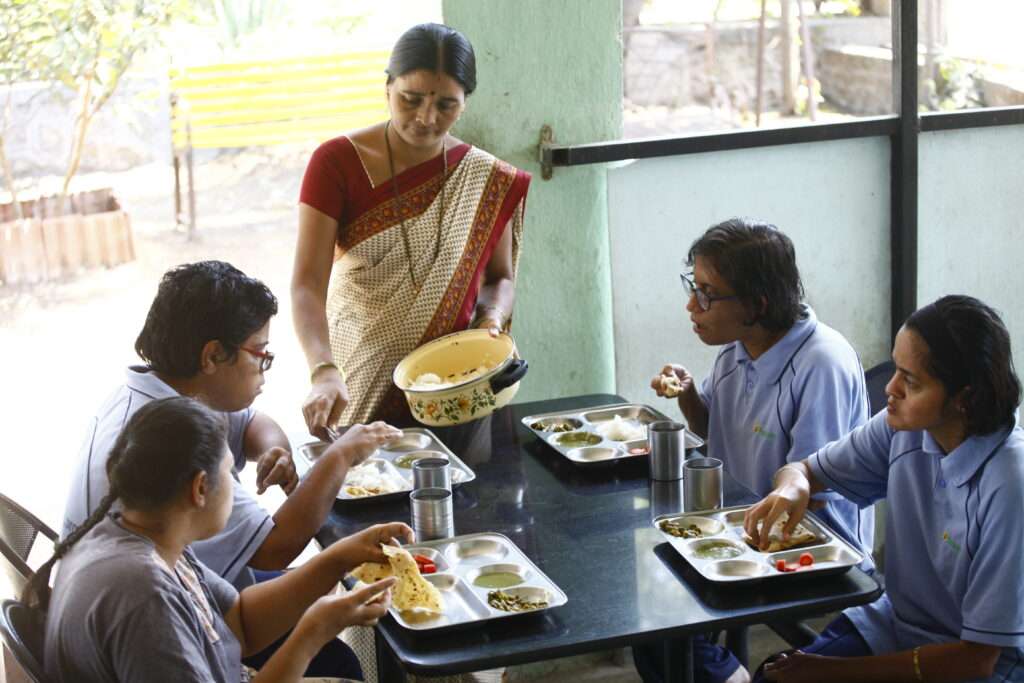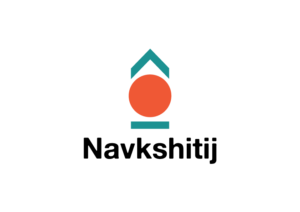
A Balanced Diet significantly improves the quality of health. While many people follow diet plans and maintain their health through conscious efforts, individuals with intellectual disabilities often lack this awareness. They may eat without considering their health needs, leading to potential health issues and behavioral problems. This lack of awareness can have severe consequences, making it crucial to provide structured and tailored dietary plans for these individuals.
At Navkshitij, we focus on enhancing the health quality of individuals with intellectual disabilities through carefully designed meal plans. Currently, we care for 85 adults with intellectual disabilities, ensuring their diet is tailored to promote long, healthy lives. Our approach goes beyond mere nutritional needs; it encompasses the overall well-being of each individual.
Our daily diet plan includes:
- Breakfast: Served at 8:30 a.m. after morning exercise, includes dry fruits and fresh fruits. This meal provides essential vitamins and minerals, setting a positive tone for the day.
- Lunch: Served at 1:00 p.m., typically comprises a balanced mix of carbohydrates, proteins, and vegetables. This meal ensures sustained energy levels throughout the day.
- Evening Snacks: At 4:30 p.m., includes tea or coffee with non-oily snacks. These snacks offer a light boost to keep individuals active without adding unnecessary calories.
- Dinner: Served at 7:30 p.m., includes a lighter meal focused on easy digestion. Proper meal timing is crucial for a good night’s sleep and overall health.
These meal timings are crucial for proper digestion. Gradually incorporating dietary tips and increasing daily movement can make a significant difference over time.
We place particular emphasis on those with conditions such as diabetes and high blood pressure, ensuring they receive meals suited to their health needs. A monthly diet plan is prepared and strictly followed to ensure consistency and balance. Monitoring these conditions through diet is vital as it helps in managing symptoms and preventing complications.
Portion control is another critical aspect. People with Down syndrome, for instance, may not recognize when they’ve had enough to eat and might consume food in excess. Therefore, we serve food with proper measurements and always under supervision. Caretakers ensure that each individual receives an appropriate amount of food based on their health conditions.
To aid digestion, we encourage walking after both lunch and dinner. Walking is an effective way to improve digestion and overall health. It also provides a form of exercise that is manageable for most individuals, helping them stay active and engaged.
Integrating Diet with Day Programs for Adults with Disabilities
Navkshitij offers comprehensive day programs for adults with disabilities, focusing on various aspects of daily living and personal growth. These programs play a crucial role in supporting dietary needs and promoting overall health.
- Living skills for adults: Teaching basic and advanced skills necessary for independent living, including meal planning, grocery shopping, and cooking healthy meals. These skills help individuals understand the importance of nutrition and how to maintain a balanced diet.
- Programs for persons with disabilities: Tailored activities that cater to the specific needs and abilities of each individual, incorporating dietary education and cooking classes to foster healthy eating habits.
Assisted Living for Adults with Disabilities
Our facilities provide assisted living for adults with disabilities, ensuring they receive the care and support they need while promoting as much independence as possible. This includes:
- Caregivers for special needs: Trained professionals who understand the unique dietary equirements of individuals with intellectual disabilities and mental illnesses, ensuring they receive balanced meals that meet their health needs.
Working with a Disability
We also support individuals in working with a disability, offering resources and guidance to help them find suitable employment. This includes:
- Intellectual disability definition: Educating employers and the community about what intellectual disability entails and how to accommodate it, including understanding dietary needs and providing appropriate meal options at the workplace.
- Mental illness and disability: Addressing the intersection of mental health and intellectual disabilities to provide comprehensive support, including nutritional guidance and stress relief through a balanced diet.
In conclusion, a proper diet and meal plan significantly enhance the health status of individuals with intellectual disabilities. At Navkshitij, our ultimate goal is to ensure our special friends live long, healthy, and enjoyable lives. By integrating a balanced diet with structured programs and compassionate care, we strive to make a positive difference in the lives of those we serve.
Be A Part Of Our Spread Happiness Movement
Bringing Happiness: Lighting Up The Lives Of Special Friends
Donate– Your contribution directly supports our programs and services, ensuring that persons with intellectual disabilities (PwIDs) receive the care and support they deserve.
Register- Join our community as a volunteer or supporter to stay updated on our initiatives and opportunities for involvement.
Spread The Word- Share our mission with others to raise awareness and advocate for the rights of PwIDs, amplifying the impact of our work.
#BringingHappiness #LifeatNavkshitij #LightingThePath
